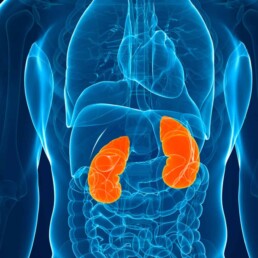As we delve deep into countless medical journals to uncover the latest on Integrative Medicine’s approach to kidney health, we are always reminded of the value of your time. Our commitment remains steadfast in curating and succinctly summarizing these vital studies for you. Welcome to the August Research and News.

Early Cognitive Impairment Linked to Accelerated Kidney Function Decline
In a prospective cohort of 5,761 World Trade Center responders (mean age ~54 years) without baseline CKD, this study found that cognitive impairment (CI), defined by a Montreal Cognitive Assessment (MoCA) score ≤23, was independently associated with rapid eGFR decline and new-onset CKD over a mean follow-up of 4.2 years.
Rapid kidney decline occurred in 10% of participants, and 4% developed CKD. Individuals with CI and dementia had significantly higher adjusted hazards for rapid eGFR decline (aHR: 1.63 and 2.42) and for incident CKD (aHR: 1.72 and 2.77, respectively), even after adjusting for demographics, comorbidities, WTC exposure, and mental health factors.
These associations held across multiple sensitivity analyses.
Why is this important?
This study identifies cognitive impairment, not traditionally recognized as a renal risk factor, as a strong and independent predictor of kidney function decline and CKD onset in middle-aged adults.
These findings suggest that CI may signal systemic vulnerability, perhaps via shared vascular or inflammatory pathways. Recognizing cognitive dysfunction as a contributor to kidney decline offers a potential opportunity for early risk stratification and intervention, particularly in populations with high occupational or environmental exposures like WTC responders.
Integrating cognitive screening into nephrology care may help identify patients at elevated risk earlier in the disease course.
Potassium Intake and Blood Pressure: How Much Matters for Hypertension?
This dose–response meta-analysis of 10 randomized controlled trials (2000–2024) evaluated the effect of potassium supplementation on blood pressure using 24-hour urinary potassium excretion as a biomarker.
Results showed that the impact of potassium intake on blood pressure varied by hypertension status. In normotensive individuals, a 50 mmol/day increase in potassium reduced systolic blood pressure (SBP) by only 0.5 mmHg and diastolic BP (DBP) by 0.12 mmHg.
However, in individuals with hypertension, the same increase led to a significant reduction of 5.3 mmHg in SBP and 3.62 mmHg in DBP. These findings were consistent across linear and spline regression models.
Why is this important?
With global hypertension prevalence doubling since 1990, non-pharmacologic interventions are critical. While sodium reduction is well-established, this study underscores the underappreciated potency of potassium, especially in hypertensive individuals, as a blood pressure-lowering nutrient.
The clear dose–response relationship supports updating dietary recommendations to emphasize potassium intake as a targeted intervention in hypertension management. Yet, the modest effects in normotensive people highlight the need for personalized dietary strategies.
Hidden in the Tap: Brominated Water Contaminants Raise CKD Risk Below Legal Limits
A prospective cohort study of over 89,000 women from the California Teachers Study found that long-term exposure to brominated trihalomethanes (THMs), a group of water disinfection byproducts, was significantly associated with increased risk of chronic kidney disease (CKD), even at concentrations below current U.S. regulatory limits.
Participants with brominated THM exposure at or above the 95th percentile (≥30.0 μg/L) had a 43% higher risk of CKD compared to those with low exposure (<0.7 μg/L).
Brominated THMs accounted for over half of the observed CKD risk in mixture models, far exceeding the contributions of uranium, arsenic, and chloroform.
The study also linked chronic exposure to bromodichloromethane with proximal tubular damage and reduced glomerular filtration rate based on prior toxicological evidence.
Why is this important?
These findings challenge the safety of current regulatory thresholds for water disinfection byproducts and suggest that legally “safe” levels of brominated THMs may still pose long-term nephrotoxic risk.
As the burden of CKD grows globally, especially in disproportionately impacted Black and Hispanic communities, this research underscores the urgent need for policymakers to revisit and differentiate regulations for individual THM species.
Clinicians should also consider environmental exposures like drinking water contaminants in risk assessments for kidney disease, particularly in vulnerable populations.
Join us to end the kidney disease epidemic
Unraveling the Protein Signature of Kidney Stones: Uromodulin Offers Protection, SSC4D Increases Risk
In the largest proteomics study of its kind, researchers evaluated over 35,000 UK Biobank participants to identify circulating proteins associated with kidney stone disease.
They found nine proteins significantly linked to stone risk, with two standing out: lower levels of uromodulin (UMOD) and higher levels of scavenger receptor cysteine-rich domain-containing group B protein (SSC4D).
Mendelian randomization confirmed these associations were likely causal, and results were replicated in the Mayo Clinic Biobank and supported by transcriptomic and GWAS data.
Notably, UMOD expression in the thick ascending limb of the nephron and its levels in blood and urine were inversely associated with stone formation, while SSC4D levels were positively associated.
Why is this important?
This study highlights how kidney stone risk may be driven by systemic protein imbalances, not just urinary solute concentration. Uromodulin is a glycoprotein produced by the kidney that plays a protective role by inhibiting crystal aggregation and modulating immune responses. Its deficiency may disrupt normal urinary defense mechanisms, increasing stone risk.
In contrast, SSC4D, an immune-related protein involved in extracellular matrix remodeling, may promote an inflammatory or fibrotic environment conducive to stone formation.
By identifying these mechanistic links, the study opens the door for biomarker-based screening and targeted therapies to prevent or slow kidney stone disease, even in individuals with preserved kidney function.
Antiemetics and the Hidden Risk: A Link to New-Onset Chronic Kidney Disease
In this large cohort study of 323,970 U.S. veterans with normal kidney function, researchers examined whether initiating antiemetics, a common class of medications used to treat nausea and vomiting, was linked to new-onset chronic kidney disease (CKD).
Among 13,154 veterans who started antiemetics, these individuals had a significantly higher risk of developing CKD over time.
This association held true across multiple statistical models, including adjusted Cox regression and propensity score methods, with hazard ratios ranging from 1.22 to 1.28.
Why is this important?
This study identifies a strong association, not necessarily a causal relationship, between antiemetic use and increased CKD risk. In other words, while antiemetic users were more likely to develop CKD, the study design cannot prove that the medications themselves directly caused kidney damage.
The increased risk may be influenced by other underlying factors, such as comorbid conditions or the reasons antiemetics were prescribed in the first place.
Still, the consistent signal across analytical approaches suggests a potential nephrotoxic effect that warrants further investigation.
Clinicians should be aware of this association and consider regular kidney function monitoring in patients on long-term antiemetics, especially those with additional CKD risk factors.
Review article of the month
Precision Nutrition in CKD
Precision nutrition in chronic kidney disease (CKD) involves tailoring dietary recommendations to an individual’s genetic, biological, and environmental characteristics, moving beyond the generalized, one-size-fits-all guidelines commonly used today.
While standard guidelines suggest interventions like low-protein diets to slow CKD progression, they often fail to account for personal differences in metabolism, age, and physiology.
Precision nutrition, distinct from but related to personalized nutrition, is more data-driven and incorporates advanced tools like nutrigenetics, microbiome profiling, metabolomics, and artificial intelligence to inform individualized care. This evolving approach offers promising opportunities to improve dietary management and outcomes in CKD patients by aligning nutrition strategies with each person’s unique biology and context. It is summarized in this review article.
Join here to receive FREE monthly updates on the latest research in Integrative Nephrology and tips on managing kidney disease straight to your inbox.
We would love to hear your feedback. Let us know what you think of these educational materials and if you would like us to focus on specific topics. Please email us at info@inkidney.com.








